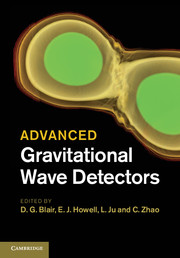Book contents
- Frontmatter
- Contents
- List of contributors
- Foreword
- Preface
- Introduction
- Part 1 An introduction to gravitational wave astronomy and detectors
- Part 2 Current laser interferometer detectors – three case studies
- Part 3 Technology for advanced gravitational wave detectors
- Part 4 Technology for third generation gravitational wave detectors
- 14 Cryogenic interferometers
- 15 Quantum theory of laser interferometer gravitational wave detectors
- 16 ET: A third generation observatory
- Index
15 - Quantum theory of laser interferometer gravitational wave detectors
from Part 4 - Technology for third generation gravitational wave detectors
Published online by Cambridge University Press: 05 March 2012
- Frontmatter
- Contents
- List of contributors
- Foreword
- Preface
- Introduction
- Part 1 An introduction to gravitational wave astronomy and detectors
- Part 2 Current laser interferometer detectors – three case studies
- Part 3 Technology for advanced gravitational wave detectors
- Part 4 Technology for third generation gravitational wave detectors
- 14 Cryogenic interferometers
- 15 Quantum theory of laser interferometer gravitational wave detectors
- 16 ET: A third generation observatory
- Index
Summary
Laser interferometers are quantum instruments. This chapter presents the quantum theory of laser interferometer gravitational wave detectors. We show the basics for analysing the quantum noise in the detector, and for deriving the associated standard quantum limit (SQL) for the sensitivity. By providing different perspectives on the origin of the SQL, we illustrate the motivations behind different approaches for surpassing the SQL.
Introduction
The most difficult challenge in building a laser interferometer gravitational wave (GW) detector is isolating the test masses from the rest of the world (e.g. random kicks from residual gas molecules, seismic activities, acoustic noises, thermal fluctuations, etc.) whilst keeping the device locked around the correct point of operation (e.g. pitch and yaw angles of the mirrors, locations of the beam spots, resonance condition of the cavities, and darkport condition for the Michelson). Once all these issues have been solved, we arrive at the issue that we are going to analyse in this chapter: the fundamental noise that arises from quantum fluctuations in the system. A simple estimate (following the steps of Braginsky, 1968) will already lead us into the quantum world – as it will turn out, the superb sensitivity of gravitational wave detectors will be constrained by the standard quantum limit (SQL), which relates to the fundamental heisenberg uncertainty principle. Further improvements of detector sensitivity beyond this require us to manipulate the quantum coherence of light to our advantage. In this chapter, we will introduce how to analyse GW detectors quantum mechanically, and will describe several advanced configurations to surpass the SQL.
Information
- Type
- Chapter
- Information
- Advanced Gravitational Wave Detectors , pp. 277 - 297Publisher: Cambridge University PressPrint publication year: 2012
